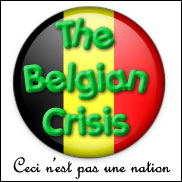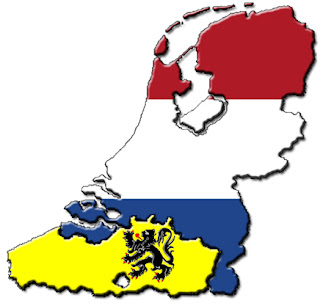Solution “N” For Flanders (And Brussels) In Europe
From the desk of Matthias Storme on Tue, 2010-11-23 18:50

As the divergences between the Flemish (Dutch-speaking) and Walloon and French-Brussels politicians have become so big that it is nearly impossible to form a federal government, opponents of a separate state of Flanders have become more aggressive in their arguments; some of these clearly amount to some form of blackmail or consist of scaremongering. One of the arguments regularly invoked in recent times against advocates of a Flemish secession is the thesis that if Flanders secedes from the federal kingdom of Belgium, it would automatically be out of the European Union; if Flanders wishes to enjoy the benefits of being part of that Union, it will have to ask for admission as a new Member State and French-speaking politicians and their allies will be able to impose draconian conditions.
May I first remind those politicians that this thesis implies that what remains of Belgium (ex hypothesi Wallonia and probably Brussels) would automatically remain as such a Member State of the EU, but they seem to forget that he who inherits the state, inherits its debts. The remains of Belgium pretending to be Belgium would be responsible for the full debt of Belgium. Some lawyers do make in this respect a very questionable distinction between a secession from the federal state on the one hand and a dissolution of that state on the other hand (this is especially debatable in the case where the seceding part forms the majority of the country, as Flanders does). I will not dwell upon this specific point here for the moment, as there is another interesting possibility for Flanders to take the edge off the blackmailing, a Solution « N ») (given the widespread use of the expression « Plan B » for the case where no agreement could be reached on a Reform of the Belgian federal state).
 The (legal) basis of this Solution « N » can be found in Article 355 paragraph 3 of the TFEU (Treaty on the Functioning of the European Union) combined with the « Statuut voor het Koninkrijk der Nederlanden » (Charter for the Kingdom of the Netherlands) (1). This Charter was created by Statute on October 28, 1954, as amended several times, and is recognised in European treaties.
The (legal) basis of this Solution « N » can be found in Article 355 paragraph 3 of the TFEU (Treaty on the Functioning of the European Union) combined with the « Statuut voor het Koninkrijk der Nederlanden » (Charter for the Kingdom of the Netherlands) (1). This Charter was created by Statute on October 28, 1954, as amended several times, and is recognised in European treaties.
This Charter of the Netherlands – (Netherlands in plural) – organizes the relations between the countries « Nederland » - in singular -, Aruba, Curaçao and Sint-Maarten as 4 separate countries having agreed to delegate to common institutions their foreign relations and defense, to have a common nationality for their citizens (Nederlanderschap) and to form together a kingdom under the house of Oranje-Nassau. Other matters may be delegated by agreement to the common institutions (art. 3 of the Charter). In other words, we have here a functioning confederation of Nederland and 3 smaller countries.
Flanders could well join as a separate country this Charter of the Kingdom of the Netherlands maintaining at the same time full autonomy in all other matters except those mentioned. We would have to merge our armies and to transfer the foreign policy to the common institutions of the Kingdom. And we would enjoy our natural nationality, being the Netherlandish one.
Such an accession would immediately terminate the blackmailing in relation to EU membership. Flanders would continue to be an integral part of the European Union as a European territory while being a part of the Confederation of the Netherlands. This status would be different from the status of Aruba, Curaçao and Sint-Maarten, as these 3 countries are associated members of the EU as «overseas countries » (2), the status by which they are [a] part of the common market but not subject to the Union law in all respects. As Flanders is a European Territory and not an overseas country or territory, Article 355 paragraph 3 of the TFEU would be applicable, which states that : « The provisions of the Treaties shall apply to the European territories for whose external relations a Member State is responsible.”
Such a solution would be attractive for the Netherlands, too. The Kingdom would have 6 million citizens more an increase its economic potential by 50 %. It would come closer again to the bigger countries with whom it would like to be treated more equally. And if a majority of the Dutch do not even exclude a full Union with Flanders, this solution could certainly find sufficient support in the North.
Moreover, such a Solution « N » would be interesting not only for Flanders, but also for Brussels. Brussels could accede to the Kingdom of the Netherlands as a separate country (and not merely a separate region) without delegating more powers than those mentioned, without being « annexed » by Flanders and having its own say in the Kingdom. Such an accession would also not change its linguistic status.
Even for Wallonia, it would not be a bad idea to reflect about the possibility to join the Confederation, equally as a separate country.
Is this the ideal scenario for Flanders ? Probably not in all respects, e.g. as it would not grant us a separate voice in the decision making procedures of the Union. That would indeed require a revision of current European treaties. But the solution would at least immunize us against the current « Francophone-Belgian » blackmailing.
__________________
(1) http://wetten.overheid.nl/BWBR0002154, in an outdated English translation @ http://www.arubaforeignaffairs.com/afa/readBlob.do?id=704 and http://www.curacaolegalportal.com/component/option,com_laws2/laws2Task,laws2Details/catid,7/laws2Id,15/Itemid,124/.See also http://www.nlembassy.org.mk/News/The_Kingdom_of_the_Netherlands_New_Constitutional_Structure/The_Kingdom_of_the_Netherlands_new_constitutional_structure (2) http://europa.eu/legislation_summaries/development/overseas_countries_territories/index_en.htm.

@ traveller
Submitted by debendevan on Wed, 2010-11-24 04:32.
Sorry I have not seen your comments there but I will definitely check them out shortly.
The thing I like about this solution is that it calls the bluff of the Francophones.
That said, I still don't understand why someone hasn't simply convened a congress of representatives from every corner of Flanders and declared independence. Sure it sounds scary and risky. Sure one could risk and lose everything. But were the odds better on July 11, 1302?
The blood of Pieter de Coninck and Jan Breydel certainly courses through some Flemish veins today. Let those men stand up, seize the day and bring on the rebirth of Flanders!
Or, opt for "Solution N". But inaction seems to me the worst possible choice for Flemish leaders.
Oh, and by the way: Long Live the Flemish Republic!
de bende van
Out of the frying pan...
Submitted by KO on Sun, 2010-11-28 20:27.
Wouldn't federating with the Netherlands subject Flemings to the same kind of exploitation by a socialistic central government that they are trying to escape? Another source of tax money to support the Moroccans etc.! And preserving membership in the EU seems nothing short of suicidal. Good luck, Flemish friends, just the same!
@ de bende van
Submitted by traveller on Tue, 2010-11-23 22:08.
I had already commented on this on "www.inflandersfields.eu".
I congratulated Mr. Storme and wrote further that I don't like particularly to be part of the European Union for many reasons, but if the Flemish politicians were too scared of the unknown then I would definitely vote for this solution.
Brilliant Solution
Submitted by debendevan on Tue, 2010-11-23 21:27.
The elegance and simplicity of this solution is not only appealing but brilliant. Although I am a strong advocate of independence, I would be delighted to see Flanders in a confederation with our Netherlandic cousins to the north.
Has this been discussed in Parliament?
de bende van